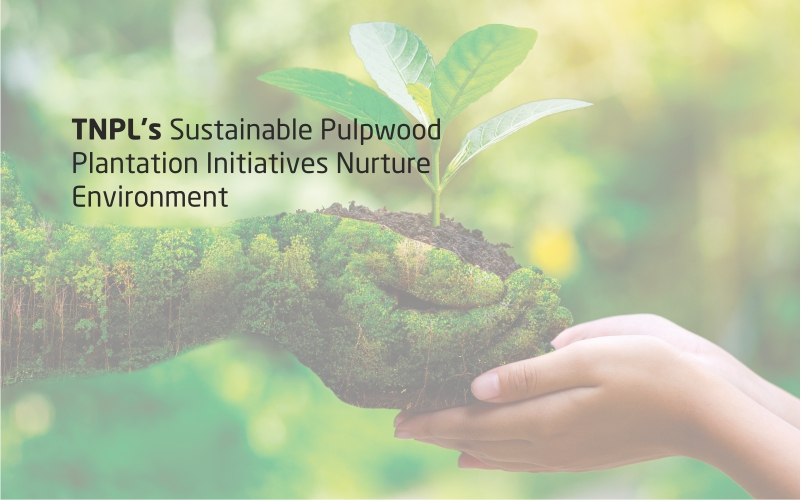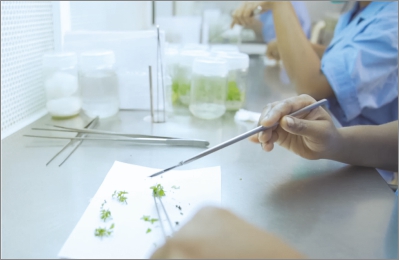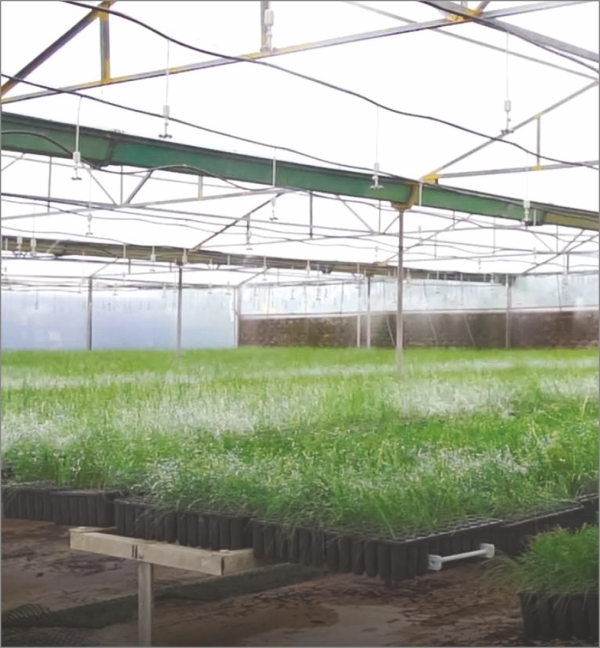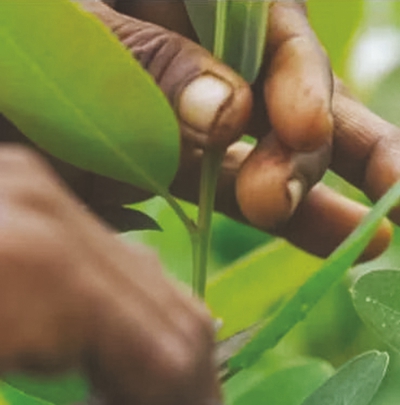
Beyond manufacturing, Tamil Nadu Newspaper & Paper Limited (TNPL) commits itself to maintaining the state of the environment through sustainable pulpwood sourcing, and giving back what it harvests through plantation schemes. Their commitment to sustainability, in harvesting, production and plantation, propels their research and innovation resulting in the production of 50 million pulpwood saplings every year. Along with taking care of the ecological aspect, TNPL also aims to improve the socio-economic status of small and marginal farmers, educate them about modern technology in pulp wood farming, and make them sustainably self-reliant.
Tamil Nadu Newspaper & Paper Limited’s plantation programme was conceived in 2004, as an initiative dedicated to source economically viable, socially acceptable and environmentally compatible pulpwood. Covering 2,11,280 acres of plantation over the past 18 years, the plantation programme aims to develop renewable and sustainable plantations in barren and degraded lands increasing the tree cover outside the natural forest, increase the plantations’ productivity through high yielding site specific clones, improve the socio-economic status of small and marginal farmers, educate and train the farmers about modern technology in pulp wood farming, as well as become sustainably self-reliant and responsibly sourcing the pulpwood raw material.
Watch: JMC Paper Tech Launches New Subsidiary JMC Papers
“Covering 2,11,280 acres of plantation over the past 18 years, the plantation programme aims to develop renewable and sustainable plantations in barren and degraded lands increasing the tree cover outside the natural forest.”
Plantation Schemes
TNPL’s plantation programme develops pulpwood cultivation under two major schemes, namely: captive and farm plantation. Under captive plantation, TNPL develops renewable and sustainable pulpwood plantations through effective, innovative and best practices available, disseminates efficient resource management practices among the farming communities and foster the growth in rural economy, employment and regional development. Under farm plantation, TNPL promotes pulpwood plantations in small and marginal farmer’s land, supplies quality seedlings or clones at subsidized price to the farm gate and provides buyback assurance with minimum support price.

The plantation areas are in Tamil Nadu and Pondicherry, divided into 5 zones, that is, North (10 districts), East (3 districts), West (9 districts), Central (1 district) and South (15 districts). Each zone is subdivided into 3 regions and each region is composed of 4 clusters. About 10-15 potential villages are covered in each cluster and grass root level plantation professionals are placed in each cluster to cater the needs of the farmers. TNPL’s captive and farm plantation schemes have been pivotal for local and marginalized farmers to gain livelihood and financial independence. The plantation schemes implemented 2,11,280 acres benefiting over 40379 farmers by raising 1,90,843 acres of farm plantation and 20,436 acres of captive plantation. These programmes facilitate sustainable harvesting of pulpwood while allowing the farmers to gain access to technological experts, hybrid quality plants at subsidized rate and an assured income, making them mutually beneficial.
Responsible Sourcing of Pulpwood from Farm Land
In 2009-10, TNPL started responsible pulpwood procurement directly from farmers, to ensure the user pays the right price directly to the grower and made pulpwood growing an economically viable business for the farmer. Till 2021-22, they procured 21.06 lakh MT of pulpwood from plantation sources till 2021-22 by paying INR 864.55 crore directly to the farmers bank account without any intermediate, a first of its kind in any Indian paper industry. TNPL also introduced semi mechanized harvesting operations with power chain saw and debarking machines from 2015-16. TNPL is the only company in the country to introduce Mobile Debarker Machine for debarking the pulpwood in the field itself from 2017-18 and also procure 100% debarked pulpwood from 2018-19. TNPL also supports farmers during natural calamities and ensures fair returns to them. Even while embracing rejuvenation of degraded lands, TNPL ensures pulpwood harvesting takes the sustainable route. By adopting precision silviculture, pulpwood is sourced through either single harvesting or coppicing.
“The plantation schemes implemented 2,11,280 acres benefiting over 40379 farmers by raising 1,90,843 acres of farm plantation and 20,436 acres of captive plantation.”
Research Initiatives for Improved Pulpwood

The company’s commitment to sustainable production powers their research and innovation, resulting in the production of 50 million pulpwood saplings every year. TNPL has one of India’s most advanced clonal propagation and research centers (CPRCs) to propagate new superior pulpwood clones through apical shoot mini-cutting technology. Through the advanced CPRC, they have successfully produced 29.30 crore pulpwood plants, supplied 27.06 crore pulpwood plants to farmers in the past 18 years, and propagated the native tree species viz., Dalbergia Sissoo, Melia dubia. Gmelina arborea apart from Eucalyptus hybrid, Casuarina hybrid, Leucaena leucocephala and Acacia mangium hybrid to avoid monoculture of large plantations. TNPL introduced 36 new eucalyptus provenance from CSIRO, Australia, assembled 838 germplasm (706 Eucalyptus; 88 Casuarina; 25 Melia: 5 Sissoo and 14 Subabul), and carried out 1,85,000 inter and intra sectional hybridization using a new crossing technique called Artificially Induced Protogyny. This produced 631 inter and intra species family seed lots. The superior lots were made and tested in 113 multi location trials in different agro climatic zones of Tamil Nadu from which 153 Superior trees (Eucalyptus 131, Casuarina 7, Sissoo 5 and Subabul 10) were selected.
With the goal to attain improved pulpwood, TNPL’s state of the art plantation R&D team works at the root and produces superior quality saplings that can tackle harsh and arid climatic conditions, soil types, fluctuating water availability, and diminishing land availability, through selecting superior trees from local sources, introducing new provenance from other countries, inter and intra hybridization, selecting candidate and trees, analyzing superior genetic material, standardizing propagation technique, multi-location trial, release of new clones, and production of quality saplings for commercial propagation. As a result of continuous research activities for the past 10 years, TNPL released three high yielding Eucalyptus clones viz., TNPL191, TNPL192 & TNPL193.
Also Read: Greenwashing: A Hindrance in the Path of Those Who Wish to Contribute to the Change
Furthermore, catering to the plantation programme’s scientific and technical needs, TNPL fosters research linkages with Forest College & Research Institute (FCRI), Mettupalayam under Tamil Nadu Agriculture University and Institute of Forest Genetics and Tree Breeding (IFGTB), Coimbatore under ICFRE. This linkage supports the development of hybrids and new varieties, achieving precision in silviculture operation and pest and disease management.

Milestones Achieved
Through taking bold steps on their journey to sustainable production, TNPL has achieved many milestones. All of TNPL’s captive plantations are certified by the Forest Stewardship Council as FSC FM Plantation with non-High Conservation Value lands. By avoiding planting near water catchment areas or any other culturally significant area for indigenous communities and ethnic groups, TNPL negates any chance of damage either to livelihoods or the ecosystem. The company developed a green belt over 650 acres around Unit-2 in Mondipatti, which houses 6.84 lakh trees, covering 55% of the total area, with the presence of 123 tree species, 26 species of shrubs, 124 species of herbs, 16 species of grasses, 35 species of medicinal plants, 91 varieties of birds, 88 varieties of orthopods, 16 species of reptiles, 10 species of mammals and 2 amphibians. TNPL’s Unit II is home to 17 Grey slender loris (Loris lydekkerianus), one of the Listed ‘Least Endangered’ in the IUCN’s List of Threatened Species.
At TNPL’s Unit-I, a green belt was developed and maintained in 40.42% of the total area with 1.68 lakh trees of 51 species and 42.89 hectares inside colony premises, which is 60% of the total area that contains 1.06 lakhs trees of 73 different species. Unit-I also has a biodiversity park with over 100 species of trees and 70 species of trees/shrubs of flowering, fruit bearing, medicinal plants within the park. These flowering plants have attracted fauna such as butterflies, various birds, reptiles and animals which have helped in increasing the pollination rate and enhancing the overall microclimate of the location.
“Through the advanced clonal propagation and research centers (CPRC), they have successfully produced 29.30 crore pulpwood plants, supplied 27.06 crore pulpwood plants to farmers in the past 18 years.”

TNPL has also established Farmers Training Center at TNPL Unit-II, inviting farmers from TNPL plantation operational areas across Tamil Nadu to create awareness and motivate them to grow pulpwood species. The training centers include guest lectures, booklets and pamphlets provided to farmers regarding plantation schemes, high yielding clonal varieties, pest & disease control measures and cultivation practices of major pulpwood species, factory visit to have an overview about TNPL factory and its operation and awards issued to best farmers to encourage other farmers in the area. To cater the needs of the farming community, TNPL has also established decentralized nurseries at five places strategically located nearer to the planting areas.



